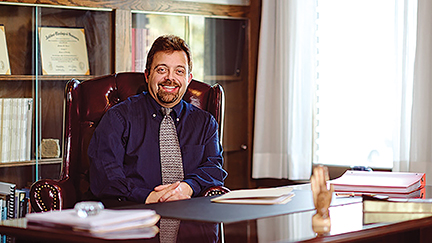An in-depth look at Ashland Theological Seminary’s Doctor of Ministry (DMin) program in Transformational Leadership with Dr. Matthew H. Bevere
In recent years, have pastors shown greater interest in leadership and management education?
Bevere: Yes, I believe so; but it goes beyond that. We’re seeing a lot of interest [in these types of offerings] among Christian leaders of all types, not just pastors.
As the landscape of ministry changes, there’s interest among Christian leaders who aren’t necessarily in full-time pastoral ministry positions. Although we certainly have those in full-time pastoral ministry in the program — they’re probably the majority — we also have Christians who lead in nontraditional ministry roles who are quite interested in leadership training.
The landscape of the culture and the church has changed. Because of that, Christian leaders are trying to navigate what it means to be in that role within the modern context. They’re looking for ways to help them do that.

What are some of the most valuable leadership skills church executives can develop today?
Bevere: In leadership, we talk a lot about skills. What are those leadership skills? One thing we really need to help students understand is that so much of leadership comes out of wisdom.
There’s certainly a body of skills which church leaders need to possess, and we can talk about those — listening skills, for example. Time management skills. People skills necessary to manage staff. Those are all very, very important.
Yet, all of those stem from leaders having the wisdom to know how to work in different situations. By this, I mean a leader must consider the context of his or her leadership — not simply as individual problems to be solved, but seeing their organization as an organic reality that’s very complex. It’s a more holistic view. So, for example, one of the things we examine is understanding leadership from a family systems perspective.
Does Ashland Theological Seminary offer advanced-level training to help pastors fill voids in their leadership acumen?
Bevere: We have a Doctor of Ministry (DMin) program in Transformational Leadership that’s designed to address several different, critical areas in Christian leadership. It’s for pastors, but not exclusively.
In this program, we look at foundational issues — how scripture is applied in leadership situations, for example. We also look at things like how leaders can address issues of power; that’s something that often goes unaddressed in many leadership materials.
Again, I’d say the most important aspect of the DMin program in Transformational Leadership is that it’s designed to help guide students through leadership within their own ministry contexts. It’s not just a matter of learning principles of leadership or a theology of leadership; we want to help students integrate their understanding of leadership from a biblical and theological point of view; we want those students to know how this is done within the context of ministry.
One of the words we use often in the DMin program is “integration.” How do you integrate your theology with the practical realities of your own leadership context?
In what ways has Ashland tried to make leadership and management training work for busy church executives?

We offer six courses over two years, each as a one-week intensive. We understand our DMin students to be a community of learners, so we want to put them in a focused, intensive experience. Obviously, they’re learning from faculty members, but they’re also learning from each other’s unique leadership experiences.
The assumption we have is that the Christian leaders who join the program are busy people. They’re all involved in ministry in some way — and actually, we want them to be involved in ministry! The main goal of the DMin program is for students to develop, implement, and then assess a leadership project within their own ministry context. To do that, they need to be in ministry leadership in some capacity. Students can be pastors, teachers, counselors, or Christian leaders in the marketplace.
— Reporting by RaeAnn Slaybaugh


